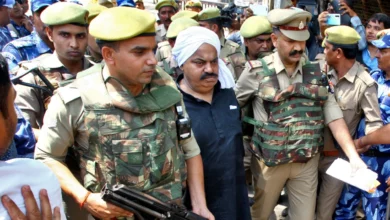Manzala Lake is a brackish lagoon on the eastern side of the Delta in Matareya district. Low, bushy islands push through its surface.
On a road leading away from the lake, a few dozen policemen chat and smoke, waving cars through a makeshift checkpoint toward the nearby Manzala town, with its narrow, bumpy streets, decaying buildings and polluted, dusty air.
Despite the checkpoint, the town seems peaceful enough.
Three weeks ago, a massive police operation in the area led to the arrest of 139 people and the confiscation of weapons including automatic rifles, according to an Interior Ministry statement. But residents say the armed gangs that have preyed on them for more than a decade are still active.
Mohamed Alloush, a fisherman who works at the lake, tells of robbery and extortion reaching back into the days of Hosni Mubarak, linked to corruption in the use of the lake’s resources, and among local police.
“There are days when I get paid LE10 because these gangs take away everything I have and then throw me and the rest of the fishermen in the water,” he says.
Deep waters
The situation faced by the inhabitants of Manzala has its roots in corruption years before the revolution, locals say. Serving as a source of cheap fish for surrounding towns, the lake enabled local fishermen to make a decent living.
“Prominent men in power claimed the water for their own. They formed barricades within the water to create fish farms at practically no cost at all,” says police Major General Mostafa Baz, who was involved in the recent wave of arrests.
Armed thugs who inhabited the islands, hiding in their long, thick grass, protected these illegal farms, Baz says. He refuses to say who these “prominent men” were. Locals accused the Mubarak's sons, Alaa and Gamal, but none were able to provide definite evidence.
Whoever was behind the gangs, thugs began to terrorize local fishermen in the area, regularly stealing their fish and boats while intimidating the people of surrounding towns — robbing, kidnapping, or even killing people.
“They would take everything we have and throw us in the water, even though many lack the ability to swim,” explains Alloush.
The fact that these thugs owned powerful motorboats made it nearly impossible to catch up with them.
Due to its proximity to Port Said, the Matareya port has earned a notorious reputation for “illicit trade,” as one local put it, making Manzala Lake a hotspot for smuggled goods, weapons and drugs.
“[Rocket-propelled grenades] and machine guns were brought in from Libya,” states a local police official who requested anonymity.
The lake has also become polluted, which made life even more difficult for the fishermen.
By the lake, as Alloush speaks, his friend Ahmed Abdu lies down on the ground next to him, trying to fix a fishing net.
Abdu turns around, leaving the net for a minute, and says, “We don’t know what will happen if the police leave. We expect the thugs to come back again if the area remains unsecured.”
He then points to the lake, where dozens of boats are docked a few footsteps away from where the fishermen usually rest after a long day at work.
“When we fish, we pray hard not to fall in the hands of those killers. We’re all old and tired, and I can assure you that I haven’t seen such weapons in the hands of the military,” Abdu says.
A dangerous road
Salam Road, which connects all the neighboring towns, has been the scene of many attacks by the armed men.
Dotted along the road are several small villages, half of which are occupied by locals and farmlands that are irrigated through a water bank that runs parallel to the decaying main motorway.
Many locals and policemen in Manzala say Sheboun and Manzala Lake are the most dangerous areas.
“Although the inner streets of towns witnessed occasional attacks, the poor lighting and broken surface of Salam, was well-suited for the thugs to claim the street for their own at night,” says Ahmed Abdel Aal, a shop owner in Asafra. “Of course I worry, and if you ask anyone around, they’ll tell you they know someone who got kidnapped, murdered or robbed.”
Armed and aggressive, the thugs were able to get their hands on whatever they could steal, from farm animals to motorbikes and cars. No one dared to stand up to them.
Abdel Aal tells the story of a friend who was driving a new car when he was stopped by thugs blocking the road, threatening him with guns to hand over the keys. After stepping out of the car, he threw the keys in the water bank. The thugs beat him to a pulp.
Despite the police presence, trouble continues. “Bridges crossing over the water are avoided at all times as thugs lurk below them, waiting for unwary passers-by,” says Mohannad al-Zoghby, a police officer at one checkpoint.
The situation escalated to catastrophic proportions, leading the townspeople to strike to demand police invention.
“It was no longer tolerable. The police had to take serious action,” one resident says.
The mafia has become so deeply entrenched within surrounding towns that many of its inhabitants have taken on roles to support the organization, residents say.
“Some towns are known to be focal points where the criminals gather,” says Abdel Aal. “Their roles vary, but the most notable are those who work closely with the thugs, some from the police, who warn them beforehand if police reach the areas where they are found.”
Locals say the situation was not dealt with before because the same powerful interests connected to the fish farms and the mob worked to protect their own interests by warding off any serious attempts to decriminalize the area.
“Some policemen work closely with criminals and thus avoid capturing them,” says Alloush.
Such claims, however, have not been possible to verify.
What the ministry is trying to do
Earlier police attempts to make arrests failed because of the advantageous terrain that the islands provided for the mobs.
“The long bushes provided great cover to hide, enabling them clear shots to anyone approaching. The waterways created through these natural islands were more difficult to navigate than the mainland desert,” says a first lieutenant who wished to remain anonymous.
He says police now use state-of-the-art technology to track down hideouts, then choppers survey the area to see where and when to proceed with their attack.
“The ministry plans to tear down those parts of the lake where the criminals usually hide, and the policemen plan to stay even after security is restored,” Baz says.
The raids and heavy police presence seems to have had at least a partial effect in restoring peace, although there have been some attacks on fishermen in the weeks since.
Police officials who speak to Egypt Independent are unwilling to discuss the origins of the community’s troubles under the old regime, which “prominent men” might have been responsible or whether they remain prominent today. The police and the Interior Ministry would rather talk about how successful their raids have been.
“What happened before is in the past, and what’s more important is what the ministry is trying to do now,” says Baz.
Alloush, the fisherman, tells Egypt Independent while holding his son that he was “scared due to the large numbers of criminals who remain, especially those hiding in the bushy islands of the lake.”
Other locals fear that many thugs have escaped to the neighboring towns and taken shelter in abandoned houses, waiting for the opportunity to return, raising questions about the police operation.
“We’ve been here for a few weeks,” says Zoghby, the policeman guarding a checkpoint. “And we’re staying a bit more.”
This piece was originally published in Egypt Independent's weeklyprint edition.



